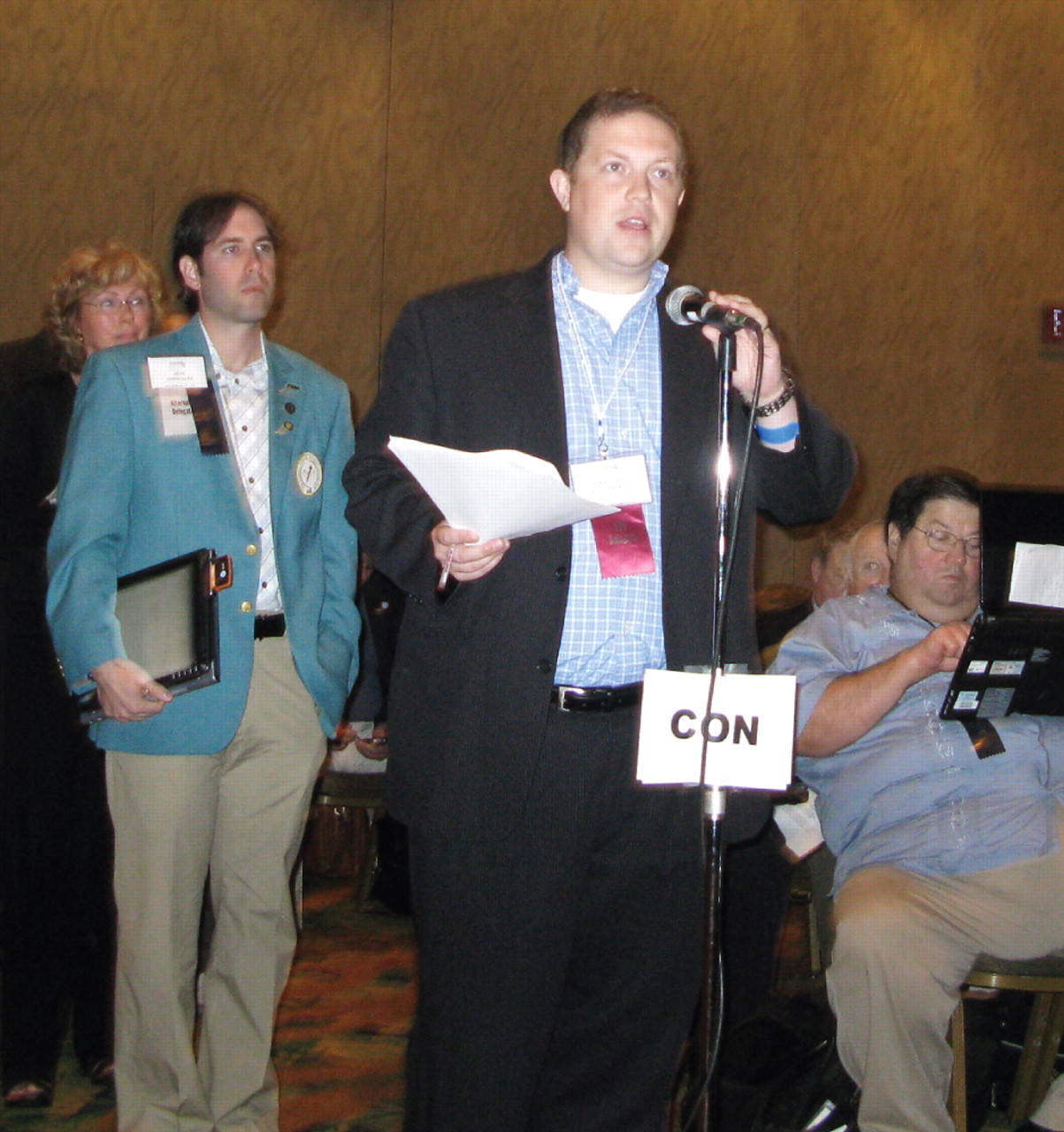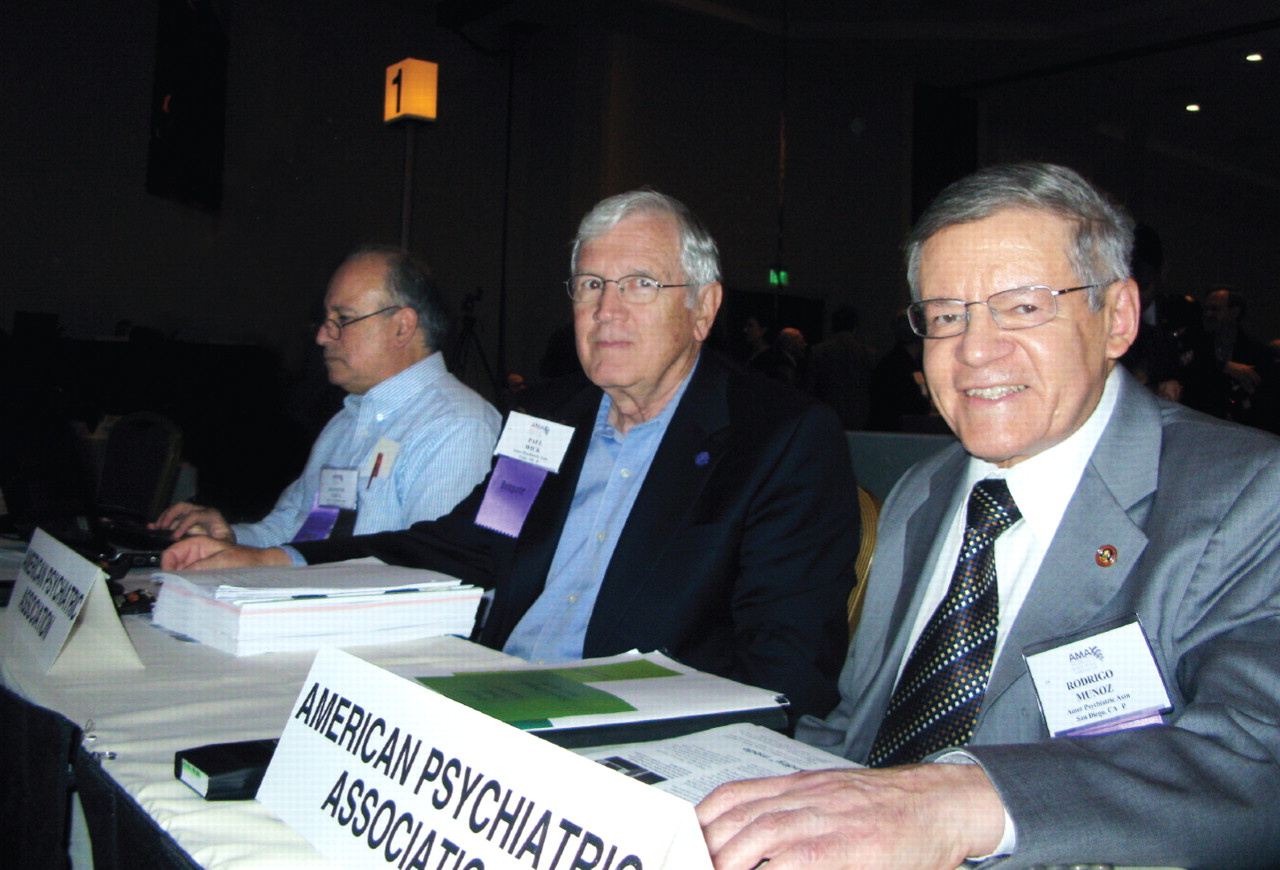Parity Law to be Focus of AMA Education Effort
The AMA will be providing educational materials to physicians and patients about the newly enacted federal parity law on insurance coverage of mental illness and substance abuse.
There was virtually unanimous support from a variety of physicians for the measure approved at last month's Interim Meeting of the House of the Delegates in Orlando, Fla.
Original wording in the resolution, submitted by the Minnesota delegation, called for a “nationwide campaign.” Though there was considerable support for such an undertaking, the fiscal note attached to the original wording was $3 million to $7 million, a figure that was widely considered untenable.

Psychiatrist Jerry Halvorson, M.D., a member of APA's delegation to the AMA, testifies during reference committee hearings on a resolution calling on the AMA to educate physicians and patients about the new federal mental health parity law.
Credit: Mark Moran
Most delegates expressed skepticism that an educational effort would need to cost so much, and the wording finally approved called on the AMA to“ develop information to be posted on our Web site that would educate physicians and the public about the benefits now afforded to them by recently passed Mental Health Parity legislation.”
The resolution received vocal support from members of the AMA Board of Trustees, residents and medical student representatives, and physicians of all stripes.
Neurologist and delegate Benjamin Whitten, M.D., of Minnesota said the parity act was a “victory” for the AMA, physicians, and patients.“ The AMA has had long-standing policy in support of this,” Whitten said.
“We are in a time of fiscal restraint,” said AMA board member Peter Carmel, M.D. “But the board is working with a consultant to totally revise our Web site, and it will be a good vehicle for education. We will put up on the AMA Web site the educational materials that are needed to inform both physicians and the lay public about mental health parity.”
“There are many ways to leverage resources to get this job done,” agreed Kevin Sherin, M.D., of Orlando, president of the American Association of Public Health Physicians. “The mission is critical and affects all specialties.”
John McIntyre, M.D., chair of the Section Council on Psychiatry, cited the“ support and enthusiasm throughout the House of Delegates for the passage” of the Paul Wellstone and Pete Domenici Mental Health Parity and Addiction Equity Act of 2008.
He added, “The AMA had lobbied along with APA for this for many years, and there was considerable celebration about its having passed. It's significant that the house thought it important that the impact be maximized by making sure that physicians and patients are fully informed.”
McIntyre added that the section council agreed that existing technological resources should be used for dissemination of information and that an expensive national campaign “was not the right way to go.”
TRICARE Under Scrutiny
In other house business of interest to psychiatrists, delegates approved a report by the AMA's Council on Medical Services outlining problems associated with physician payment under the military's TRICARE health care system and with recruitment of clinicians—especially mental health professionals.
After testimony from psychiatrists and other physicians about the importance of recruiting mental health clinicians, delegates approved the report with a resolution calling on the AMA to “encourage the TRICARE Management Activity and its contractors to continue and strengthen their efforts to recruit and retain mental health and addiction service providers in TRICARE networks, which should include providing adequate reimbursement for mental health and addiction services.”
Also approved was a recommendation that the AMA “strongly urge the TRICARE Management Activity to implement significant increases in physician payment rates to ensure all TRICARE beneficiaries, including service members and their families, have adequate access to and choice of physicians.”

Seated at the AMA House of Delegates meeting are Section Council on Psychiatry members (from right) Rodrigo Muñoz, M.D., Paul Wick, M.D., and Ken Certa, M.D.
Credit: Mark Moran
APA President Nada Stotland, M.D., testified during reference committee hearings in support of the measure. “Service in the military has resulted in a devastating epidemic of mental illnesses, causing disability and pain to members and veterans of the armed services and their families. All too often these illnesses, when untreated, end tragically, in suicide.
“The American Psychiatric Association has conducted a membership survey,” Stotland said. “Psychiatrists report payment obstacles and low reimbursement so severe that they either cannot participate or regard participation as charity care.”
Stotland also informed the house that the American Psychiatric Foundation has supported the development of a program called Give an Hour, encouraging members to volunteer time to treating veterans. “Thousands of mental health professionals are donating an hour of direct service, consultation, or education each week,” she said (see Original article: More Professionals See Value of Volunteering to Help Vets).
She provided delegates written information about Give an Hour and urged physicians to visit the program's Web site at<www.giveanhour.org>.
McIntyre, who serves on the AMA Council on Medical Services, noted that the council had met with Maj. Gen. Elder Granger, M.C., a physician and deputy director and program executive office of TRICARE. He said that Granger was very welcoming of input from physicians about the matter of physician payment and manpower shortage areas and had vowed to continue being in contact with the council.
Action Taken on Immunizations
APA representatives were also involved in shaping measures by the house to address misinformation about childhood vaccines and their alleged but unproven-causal relationship with autism.
The house passed a resolution calling on the AMA to draft model legislation that states can pursue to enact more stringent requirements for parents and legal guardians to obtain personal-belief exemptions from state immunization requirements, develop educational materials that can be distributed to patients and their families articulating the benefits of immunizations and highlighting the exemplary safety record of vaccines, and communicate and work with other concerned organizations about effective ways to continue to support immunizations while rejecting claims that have no foundation in science.
The addition of a recommendation that the AMA develop educational materials was prompted by reference committee testimony from child psychiatrist and psychiatry section council member Louis Kraus, M.D.
“Time and time again I hear from families wondering if they should avoid vaccines,” Kraus said. “Thousands of kids are not being vaccinated because of faulty information. One of the key components of this resolution is not just that we support the concept of vaccination but that we support the dissemination of information. There is repetitive research showing that vaccines are not a causative agent of autism.” ▪



